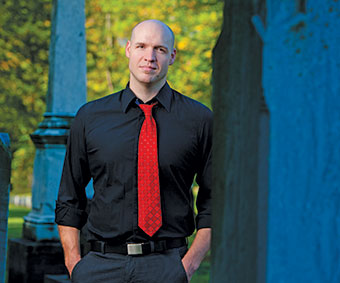John Edgar Browning: Vampire Expert

Get to know a Buffalonian...
John Edgar Browning: Vampire Expert
In connection with our Halloween issue, we spoke with John Edgar Browning, a PhD student in American Studies at the University at Buffalo and expert on vampires specializing in the Dracula figure in film, literature, television, and popular culture. He has written eight books, including Dracula in Visual Media (2010) which won the Lord Ruthven award, honoring the most deserving work in vampire fiction or scholarship.
From where does the vampire story first trace its roots? How and why do you think so many different cultures were able to produce such similar mythologies?
The origin of the word, “vampire,” itself dates back the early eighteenth century, but the origin of vampiric figures is impossible to date. Suffice to say that as long as humankind has been recording its history, it’s been recording vampiric figures, though they are undoubtedly older than even human record. The endurance of vampiric myths is probably intertwined with the significance cultures have placed on blood--the embodiment of life and, it was believed by some, a “vehicle” for the “soul.” The apparent overlap between different vampiric myths all over the world is, I would imagine, similar in essence to pyramid-type construction, which also can be found the world over: practicality in design. Also, where humans have traveled, their myths, and their beliefs about soul and blood, have traveled with them; vampires survived through memory.
How does it so acutely tap into our fears?
For millennia the vampire’s potency rested, especially for rural villagers, in its inexplicable (i.e. supernatural) existence and its capacity for taking life; the subsequent turning process was only secondarily important, a by-product often swiftly dealt with by way of stake. Since the vampire’s re-embodiment in literature in the early nineteenth century, it is the turning that has most provoked fear, fear not in the process itself but in how much we might enjoy it.
Tell us a little bit about your research into “real life” vampirism. Just who the hell are these weirdos exactly?
People who self-identify as vampire are no more weird than the average, “normal” asshole on the street. They are simply themselves.
Are we seeing a renaissance so to say in vampire pop culture? Is professing an interest in the dark arts kinda going mainstream?
Vampires, in many ways, have always been in vogue, whether mythically or artistically; however, the recent, popular “resurgence” seems to have occurred in tangent with the economic recession, which wouldn’t be the first time that sort of thing has happened. When money is low, morale is low and fear is high. Killing vampires and monsters boosts morale because we tend to vent fear doing it. Of course, to vent fear in this way, one has only to spend a little money, e.g. on movie tickets. The relationship between vampires and economic hard times becomes clear.
How does Hollywood today portray vampires right? What is it doing wrong?
Hollywood, generally thought not always, gives us exactly what we need, or think we need, at that particular place and time. Vampires interpret the human condition, but if they’re clever enough they can also anticipate it.
What are your feelings about contemporary popular culture attitudes towards vampires (read: Twilight)? Honestly, do you think it sucks as much as we do? I mean, when did vampires turn nice?
We’re seeing a sort of contradiction as well as negotiation between the opposing twi-hards and fangbangers. I used to think it was as simple as traditional, outdated conservatism versus liberal progression, but I think I may have been a bit premature in my assessment. Instead, what we’re actually seeing is, I think, the inevitable future of vampires (i.e. True Blood) and a vehicle for articulating , and at the same time coping with, the inevitability of that future (i.e. Twilight). Vampires aren’t by necessity evil anymore, not all of them anyway; even the more conservative market can cope with this supposed “blasphemy,” so long as vampires marry their victims before they bite them.
Pound for Pound, which is your favorite film, book or otherwise depiction of the vampire myth and why?
Folks who can’t stomach classics like Nosferatu (1922), Dracula (1931), or Horror of Dracula (1958) might fare better with forgotten gems like Near Dark (1987), Pale Blood (1990), Subspecies (1991), or Vampire Journals (1997). Though, the most important vampire film of the last 10 years is Bram Stoker’s Dracula (1992).
blog comments powered by Disqus|
Issue Navigation> Issue Index > v10n43 (Week of Thursday, October 27) > John Edgar Browning: Vampire Expert This Week's Issue • Artvoice Daily • Artvoice TV • Events Calendar • Classifieds |









 Current Issue
Current Issue